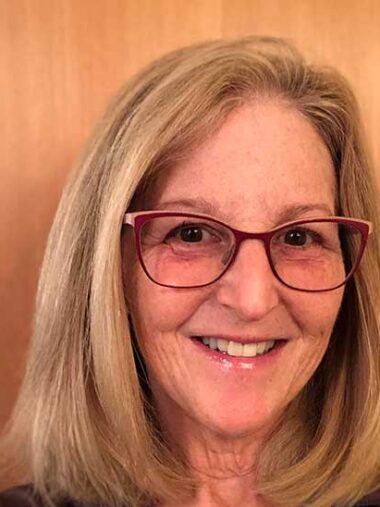
Melinda Kramer
- Khoury Alumni
- BS in Computer Science ’83
- Member of Khoury College’s first graduating class
For Melinda Kramer, professional pivots are nothing new.
That’s how Kramer, a member of Northeastern’s first computer science graduating class, marched from R&D co-ops and Wall Street firms to software consulting and start-up advising. And now, retired from her computing-and-business career, and with her advocacy work and far-flung hiking journeys to keep her busy, it’s worth peering back at the professional trail she’s trekked.
It began during her freshman year as a Northeastern business student.
“Even back then, I had a sense that tech could make a difference in the world,” she says.
“I went on co-op, and being my young self, decided I already knew all of this and needed to try something different,” she reminisces. Luckily, after she pivoted between different science degrees and recognized her interests in math, hardware, and problem solving, Northeastern’s curricula had evolved to match her interests.
“By my senior year, Northeastern had an official computer science college,” she says. “I loved the emerging technology, so I and 18 others became the first graduating class in computer science.”
Shortly thereafter, Kramer began her career on Wall Street, where she developed software for JPMorgan’s mainframe computers.
“It was fascinating to learn about the finance world, but after a few years, I got bored and wanted to try something new, so I pivoted to join a consulting firm,” she recalls. “I realized that I didn’t want to be a software developer, but I did want to be at the intersection of technology and business.
Her tech–business consulting work at Leveraged Technology wouldn’t take Kramer far from the word of software. The financial world was gradually moving online, and to build the tools traders now needed, coding support was essential. In one project, Kramer and her team developed what she called “a new concept in foreign exchange trading” — digital infrastructure for an industry that had conducted its business mostly over the phone. The goals, she says, were efficient record-keeping and faster settlements, which would eliminate failed trades if she could encourage traders to trust the tech.
During her time with the firm, Kramer traveled to Hong Kong and the UK for business, earned her MBA from NYU, and eventually took charge of her department. Then, in the early 90s, she moved to Chicago, where she soon joined Goldman Sachs and built the company’s first web-based money market trading systems. But her longest professional stint would come through one of a handful of her consulting clients.
“I was advising [GCM Grosvenor] while they were running everything out of one massive, sophisticated, incredible Excel spreadsheet,” Kramer recalls. “For growth and management, I advised them to hire someone with tech experience, someone who could systematically develop something to support their portfolio management. And they said, ‘How about you?’”
And so it was. After building software to replace Grosvenor’s behemoth spreadsheet, Kramer spent more than a decade running their new software department, and even hired a Northeastern co-op along the way.
Now, after more than 30 years in tech, Kramer has focused on giving back in retirement. For a while, that took the form of KloudVentures, in which Kramer offered mentorship, networking, and investment to Chicago-area women looking to build tech careers like she had. Now she’s turning much of her focus to her philanthropy and advocacy for women, the LGBTQ community, and disadvantaged children, which began with her co-heading the Chicago chapter of Help for Children.
I was advising [GCM Grosvenor] while they were running everything out of one massive, sophisticated, incredible Excel spreadsheet. For growth and management, I advised them to hire someone with tech experience, someone who could systematically develop something to support their portfolio management. And they said, ‘How about you?
“We raised awareness and money for organizations around the world that worked to prevent and treat child abuse,” Kramer explains. “We raised millions of dollars per year through our business networks, then spent time getting to know local organizations, vetting them, and providing grants.” Now she does similar work with Impact Grants Chicago, an all-female nonprofit with an even wider philanthropic mission. She also advocates for transgender people and communities, typically in the form of one-to-one relationship-building rather than large-scale public philanthropy.
But even in retirement, her computing connection can’t help but come full circle. In 2021, Alex Ernst, one of Kramer’s two children, graduated from Khoury College. And just like his mom, he’s forging a career at the intersection of computing and another field — music in his case, through a software engineering job at Spotify. Through him, as well as her financial support of Khoury College and her old Husky rowing team, Kramer says she’s never lost touch with the university where she first dove into computing.
“I have a soft spot in my heart for Northeastern; it really was a great fit and opportunity for me,” she says. “Northeastern remains core to a lot of my world.”